raise;rise的用法
raise与rise的区别用法

raise与rise的区别用法Raise和rise这两个词可真是让好多小伙伴头疼呢,今天咱们就来好好唠唠它们的区别用法。
一、基本含义。
Raise是个及物动词,啥叫及物动词呢?就是它后面得跟着个东西,就像个小跟班似的。
比如说,“raise your hand”(举起你的手),这里的“your hand”就是它带着的小跟班。
它有很多意思呢,像“提高、提升、养育、筹集”。
就像我们说“raise the salary”(提高工资),老板要是说要给你“raise the salary”,那可真是个好消息呢。
还有“raise a child”(养育一个孩子),这可不容易呀,得花好多心血呢。
再比如说“raise money”(筹集资金),要是想搞个什么活动,就得想办法“raise money”。
而rise呢,它是个不及物动词,就比较特立独行啦,不需要后面跟着个小跟班。
它主要的意思是“上升、升起、上涨”。
比如“the sun rises”(太阳升起),每天早上太阳公公“rise”的时候,感觉新的一天就充满了希望呢。
还有“the price rises”(价格上涨),这时候我们就会觉得有点小郁闷啦,东西变贵了嘛。
二、用法区别。
1. 在句子结构上。
因为raise是及物动词,所以在句子里经常是“主语 + raise + 宾语”这样的结构。
比如说,“They raise a lot of questions.”(他们提出了很多问题)。
这里“they”是主语,“a lot of questions”就是宾语啦。
而rise呢,因为是不及物动词,它的句子结构就是“主语 + rise”。
像“Smoke rises.”(烟升起),“smoke”自己就可以“rise”,不需要后面再跟着啥东西。
2. 在表示“上升”这个意思的时候。
虽然它们都有上升的意思,但是用法不太一样。
“raise”往往是人为地使某个东西上升,是一种主动的行为。
比如说“raise the flag”(升旗),这是有人去把旗升起来的。
raise和rise的用法

raise和rise的用法1.引言在英语中,r ai se和r is e是两个常用的动词,然而很多学习者经常对它们的用法感到困惑。
本文旨在通过清晰、简洁且生动的语言,解释r a is e和ri se的用法,帮助读者正确应用这两个词汇。
2. ra ise的用法2.1及物动词在及物动词的用法中,ra ise表示提高或抬起某物,并且必须有对象。
例如:-H er ai se dh is ha ndt o as ka qu es ti on.(他举起手来问问题。
)-S he ra is es he rv oic e wh en sh ei sa ng ry.(她生气时会提高声音。
)2.2非及物动词在非及物动词的用法中,ra is e表示增加或升高某种情况,不需要对象。
例如:-T he pr ic es of go ods h av er ai se dr ec ent l y.(物价最近上涨了。
)-T he te mp er at ur era i se si ns um me r.(夏季气温升高。
)3. ri se的用法3.1不及物动词R i se是一个常用的不及物动词,意为上升或升起,通常没有宾语。
例如:-T he su nr is es in the e as t.(太阳从东方升起。
)-T he sm ok er os ef rom t he ch im ne y.(烟从烟囱升起。
)3.2副词修饰R i se也可以被副词修饰,表达起床或站立的意思。
例如:-H er os ee ar ly in the m or ni ng.(他早上早早起床。
)-T he au di en ce ro sea n da pp la ud ed.(观众起立鼓掌。
)4. ra ise和r i s e的区别4.1含义R a is e通常指提高、升高,常用于及物动词的形式;而ri se则表示上升、升起,常用于不及物动词的形式。
Rise-raise的区别及练习
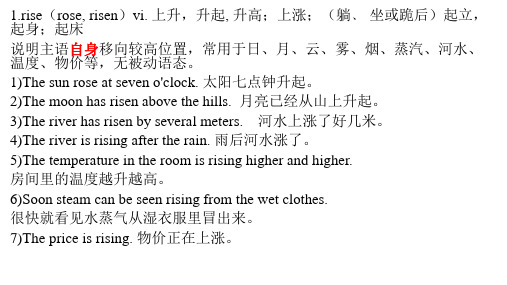
填空 4. The people's living standard has greatly been ______. 5. Her temperature is still ______. 6.They ______ glasses to the friendship between the two peoples just now. 7. This weight is too heavy; I can't ______it. 这东西太重,我举不起来。 9.Salaries have been ______. 现在薪水已增加了。 选择 1. The prices are ______ fast these days. Nobody can get the prices ______. A. going down; to bring down B. rising; bring down C. raising; bring down D. rising; brought down. 2. They've ______ up to 20,000 yuan for the Hope Project. A. rose B. raise C. raised D. risen 4. Last year the advertising rate________by 20 percent. A. raised B. rose 4. raised 5. rising 6.raised 注意时态 7.raise9.raisede vt. 说明主语发出的动作是要作用于其它事物的,往往有使物体 达到其应有的高度的含义。可用于被动语态。如: 1)招募:to raise an army 2)养育、栽培:to raise a family 3)提高raise salaries工资, raise the rent租金。 4)举起raise one's hand 5)提出问题 raise a question 1)Salaries have now been raised. 现在薪水已增加了。 2)The price was raised to £10. 价格涨到十英镑。 3)Heavy rain raised the river stage. 暴雨使河水水位升高。 4)The boss promised to raise her salary. 老板答应要给她加薪水。
动词近义词辨析
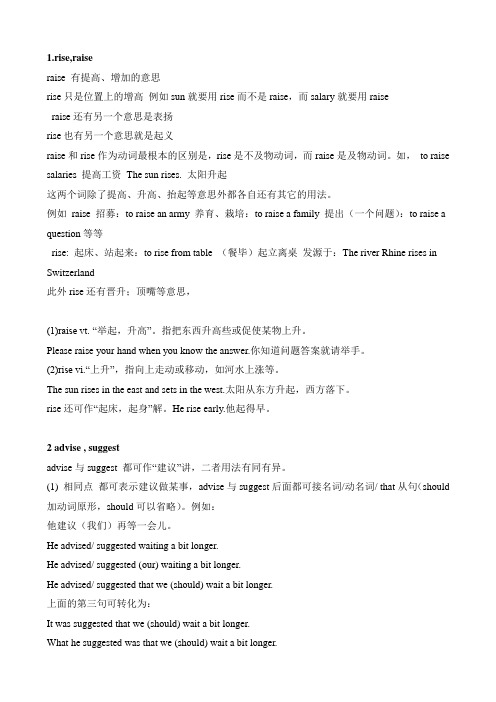
1.rise,raiseraise 有提高、增加的意思rise只是位置上的增高例如sun就要用rise而不是raise,而salary就要用raiseraise还有另一个意思是表扬rise也有另一个意思就是起义raise和rise作为动词最根本的区别是,rise是不及物动词,而raise是及物动词。
如,to raise salaries 提高工资The sun rises. 太阳升起这两个词除了提高、升高、抬起等意思外都各自还有其它的用法。
例如raise 招募:to raise an army 养育、栽培:to raise a family 提出(一个问题):to raise a question等等rise: 起床、站起来:to rise from table (餐毕)起立离桌发源于:The river Rhine rises in Switzerland此外rise还有晋升;顶嘴等意思,(1)raise vt. “举起,升高”。
指把东西升高些或促使某物上升。
Please raise your hand when you know the answer.你知道问题答案就请举手。
(2)rise vi.“上升”,指向上走动或移动,如河水上涨等。
The sun rises in the east and sets in the west.太阳从东方升起,西方落下。
rise还可作“起床,起身”解。
He rise early.他起得早。
2 advise , suggestadvise与suggest 都可作“建议”讲,二者用法有同有异。
(1) 相同点都可表示建议做某事,advise与suggest后面都可接名词/动名词/ that从句(should 加动词原形,should可以省略)。
例如:他建议(我们)再等一会儿。
He advised/ suggested waiting a bit longer.He advised/ suggested (our) waiting a bit longer.He advised/ suggested that we (should) wait a bit longer.上面的第三句可转化为:It was suggested that we (should) wait a bit longer.What he suggested was that we (should) wait a bit longer.His suggestion was that we (should) wait a bit longer.(2)不同点①advise后可以直接跟人称代词作宾语,如:advise sb. to do sth.; advise sb. against (doing) sth.; advise sb. on/ about sth.; 而suggest后一般用suggest sb that …形式。
rise和raise的用法
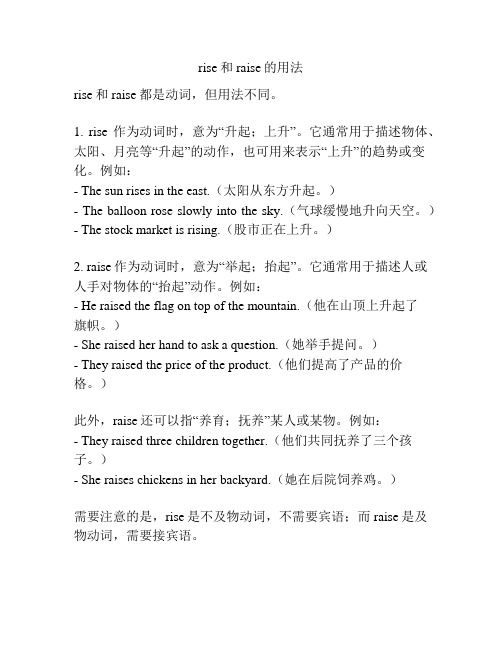
rise和raise的用法
rise和raise都是动词,但用法不同。
1. rise作为动词时,意为“升起;上升”。
它通常用于描述物体、太阳、月亮等“升起”的动作,也可用来表示“上升”的趋势或变化。
例如:
- The sun rises in the east.(太阳从东方升起。
)
- The balloon rose slowly into the sky.(气球缓慢地升向天空。
)- The stock market is rising.(股市正在上升。
)
2. raise作为动词时,意为“举起;抬起”。
它通常用于描述人或人手对物体的“抬起”动作。
例如:
- He raised the flag on top of the mountain.(他在山顶上升起了
旗帜。
)
- She raised her hand to ask a question.(她举手提问。
)
- They raised the price of the product.(他们提高了产品的价格。
)
此外,raise还可以指“养育;抚养”某人或某物。
例如:
- They raised three children together.(他们共同抚养了三个孩子。
)
- She raises chickens in her backyard.(她在后院饲养鸡。
)
需要注意的是,rise是不及物动词,不需要宾语;而raise是及物动词,需要接宾语。
raise,rise,arise的区别(精选范文)
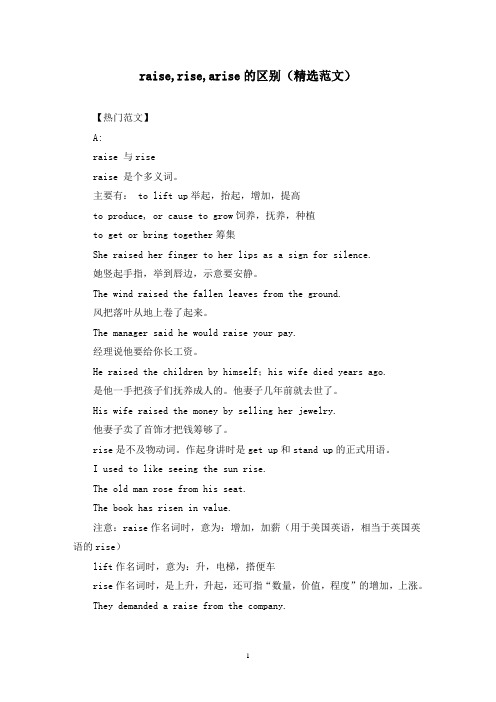
raise,rise,arise的区别(精选范文)【热门范文】A:raise 与riseraise 是个多义词。
主要有: to lift up举起,抬起,增加,提高to produce, or cause to grow饲养,抚养,种植to get or bring together筹集She raised her finger to her lips as a sign for silence.她竖起手指,举到唇边,示意要安静。
The wind raised the fallen leaves from the ground.风把落叶从地上卷了起来。
The manager said he would raise your pay.经理说他要给你长工资。
He raised the children by himself;his wife died years ago.是他一手把孩子们抚养成人的。
他妻子几年前就去世了。
His wife raised the money by selling her jewelry.他妻子卖了首饰才把钱筹够了。
rise是不及物动词。
作起身讲时是get up和stand up的正式用语。
I used to like seeing the sun rise.The old man rose from his seat.The book has risen in value.注意:raise作名词时,意为:增加,加薪(用于美国英语,相当于英国英语的rise)lift作名词时,意为:升,电梯,搭便车rise作名词时,是上升,升起,还可指“数量,价值,程度”的增加,上涨。
They demanded a raise from the company.1。
辨析raise和rise
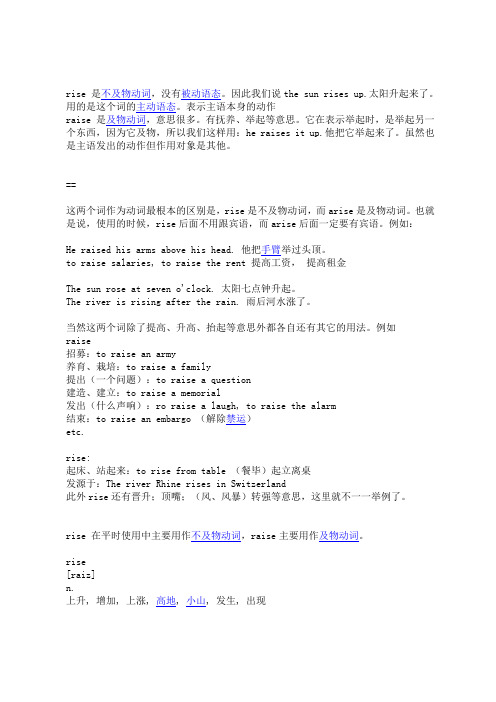
rise 是不及物动词,没有被动语态。
因此我们说the sun rises up.太阳升起来了。
用的是这个词的主动语态。
表示主语本身的动作raise 是及物动词,意思很多。
有抚养、举起等意思。
它在表示举起时,是举起另一个东西,因为它及物,所以我们这样用:he raises it up.他把它举起来了。
虽然也是主语发出的动作但作用对象是其他。
==这两个词作为动词最根本的区别是,rise是不及物动词,而arise是及物动词。
也就是说,使用的时候,rise后面不用跟宾语,而arise后面一定要有宾语。
例如:He raised his arms above his head. 他把手臂举过头顶。
to raise salaries, to raise the rent 提高工资,提高租金The sun rose at seven o'clock. 太阳七点钟升起。
The river is rising after the rain. 雨后河水涨了。
当然这两个词除了提高、升高、抬起等意思外都各自还有其它的用法。
例如raise招募:to raise an army养育、栽培:to raise a family提出(一个问题):to raise a question建造、建立:to raise a memorial发出(什么声响):ro raise a laugh, to raise the alarm结束:to raise an embargo (解除禁运)etc.rise:起床、站起来:to rise from table (餐毕)起立离桌发源于:The river Rhine rises in Switzerland此外rise还有晋升;顶嘴;(风、风暴)转强等意思,这里就不一一举例了。
rise 在平时使用中主要用作不及物动词,raise主要用作及物动词。
rise[raiz]n.上升, 增加, 上涨, 高地, 小山, 发生, 出现vi.升起, 起身, 发源, 起义, 高耸, 增长, 上升, 复活vt.使飞起rise[raIz]vi.rose, risen, rising(太阳、月亮、星星)升起,出现The sun rose at seven o'clock.太阳七点钟升起。
rise raise的用法区别
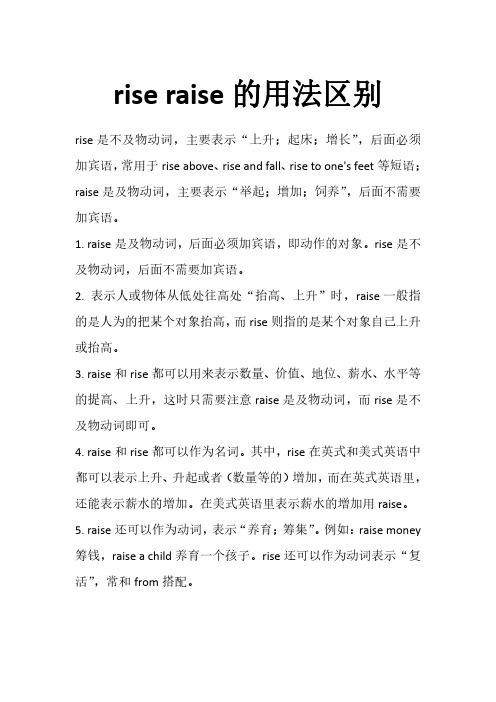
rise raise的用法区别
rise是不及物动词,主要表示“上升;起床;增长”,后面必须加宾语,常用于rise above、rise and fall、rise to one's feet等短语;raise是及物动词,主要表示“举起;增加;饲养”,后面不需要加宾语。
1.raise是及物动词,后面必须加宾语,即动作的对象。
rise是不及物动词,后面不需要加宾语。
2.表示人或物体从低处往高处“抬高、上升”时,raise一般指的是人为的把某个对象抬高,而rise则指的是某个对象自己上升或抬高。
3.raise和rise都可以用来表示数量、价值、地位、薪水、水平等的提高、上升,这时只需要注意raise是及物动词,而rise是不及物动词即可。
4.raise和rise都可以作为名词。
其中,rise在英式和美式英语中都可以表示上升、升起或者(数量等的)增加,而在英式英语里,还能表示薪水的增加。
在美式英语里表示薪水的增加用raise。
5.raise还可以作为动词,表示“养育;筹集”。
例如:raise money 筹钱,raise a child养育一个孩子。
rise还可以作为动词表示“复活”,常和from搭配。
raise与rise的区别及有关raise的固定搭配
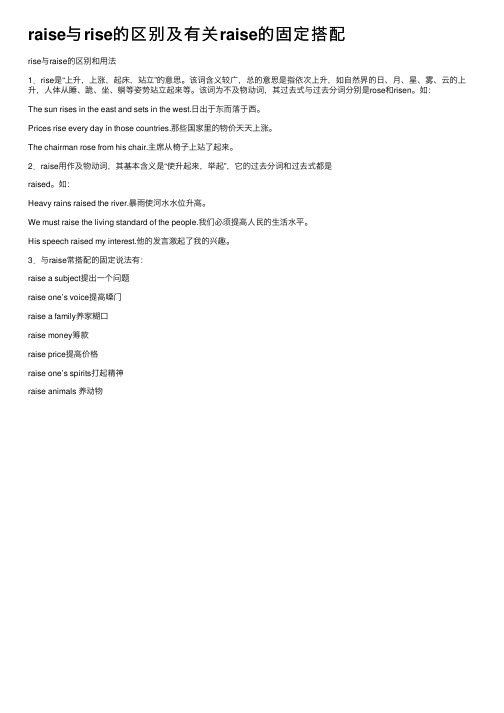
raise与rise的区别及有关raise的固定搭配
rise与raise的区别和⽤法
1.rise是“上升,上涨,起床,站⽴”的意思。
该词含义较⼴,总的意思是指依次上升,如⾃然界的⽇、⽉、星、雾、云的上升,⼈体从睡、跪、坐、躺等姿势站⽴起来等。
该词为不及物动词,其过去式与过去分词分别是rose和risen。
如:
The sun rises in the east and sets in the west.⽇出于东⽽落于西。
Prices rise every day in those countries.那些国家⾥的物价天天上涨。
The chairman rose from his chair.主席从椅⼦上站了起来。
2.raise⽤作及物动词,其基本含义是“使升起来,举起”,它的过去分词和过去式都是
raised。
如:
Heavy rains raised the river.暴⾬使河⽔⽔位升⾼。
We must raise the living standard of the people.我们必须提⾼⼈民的⽣活⽔平。
His speech raised my interest.他的发⾔激起了我的兴趣。
3.与raise常搭配的固定说法有:
raise a subject提出⼀个问题
raise one’s voice提⾼嗓门
raise a family养家糊⼝
raise money筹款
raise price提⾼价格
raise one’s spirits打起精神
raise animals 养动物。
英语语法知识点详解raise和rise的区别
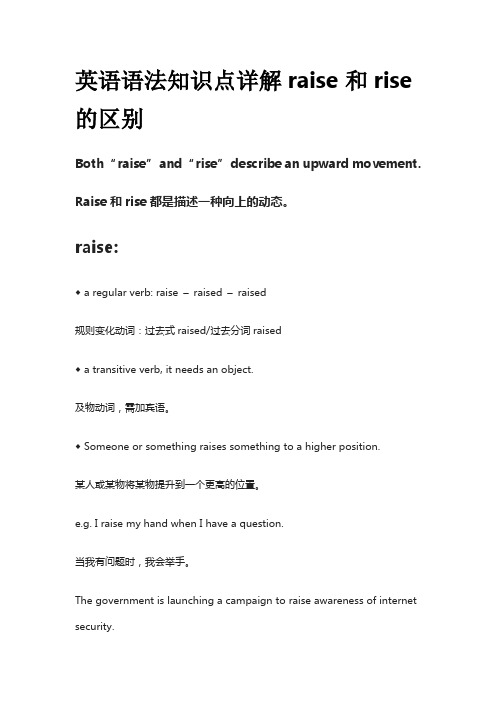
英语语法知识点详解raise和rise 的区别Both “raise”and “rise”describe an upward movement. Raise和rise都是描述一种向上的动态。
raise:◆ a regular verb: raise –raised –raised规则变化动词:过去式raised/过去分词raised◆ a transitive verb, it needs an object.及物动词,需加宾语。
◆ Someone or something raises something to a higher position.某人或某物将某物提升到一个更高的位置。
e.g. I raise my hand when I have a question.当我有问题时,我会举手。
The government is launching a campaign to raise awareness of internet security.政府正在开展一项提高对互联网安全认识的运动。
◆ When we raise a child, we look after them until it is an adult.当我们说raise a child, 意思是抚养他们成人。
e.g. She raised four kids virtually singlehanded.她几乎是凭一人之力抚养了4个孩子。
rise:◆ an irregular verb: rise –rose –risen不规则变化动词:过去式rose/过去分词risen◆ an intransitive verb, it doesn’t have an object after it.不及物动词,无需加宾语。
◆ It refers to the action of going up or increasing by itself.强调的是动作本身自行升高或增加。
riseVS raise
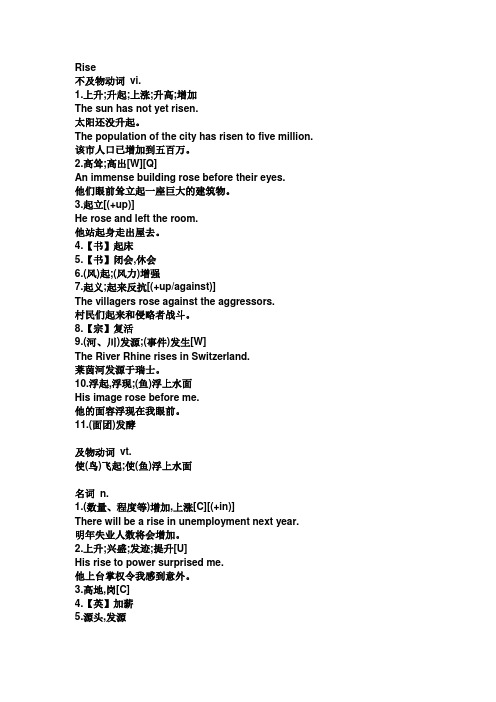
不及物动词vi.1.上升;升起;上涨;升高;增加The sun has not yet risen.太阳还没升起。
The population of the city has risen to five million. 该市人口已增加到五百万。
2.高耸;高出[W][Q]An immense building rose before their eyes.他们眼前耸立起一座巨大的建筑物。
3.起立[(+up)]He rose and left the room.他站起身走出屋去。
4.【书】起床5.【书】闭会,休会6.(风)起;(风力)增强7.起义;起来反抗[(+up/against)]The villagers rose against the aggressors.村民们起来和侵略者战斗。
8.【宗】复活9.(河、川)发源;(事件)发生[W]The River Rhine rises in Switzerland.莱茵河发源于瑞士。
10.浮起,浮现;(鱼)浮上水面His image rose before me.他的面容浮现在我眼前。
11.(面团)发酵及物动词vt.使(鸟)飞起;使(鱼)浮上水面名词n.1.(数量、程度等)增加,上涨[C][(+in)]There will be a rise in unemployment next year.明年失业人数将会增加。
2.上升;兴盛;发迹;提升[U]His rise to power surprised me.他上台掌权令我感到意外。
3.高地,岗[C]4.【英】加薪5.源头,发源及物动词vt.1.举起,抬起He raised his glass and said: "Your health, Carl."他举起了杯子说道:"祝你健康,卡尔。
"2.增加;提高;提升[(+to)]The landlord raised my rent.房东提高了我的租金。
raise,rise,arise和arouse辨析
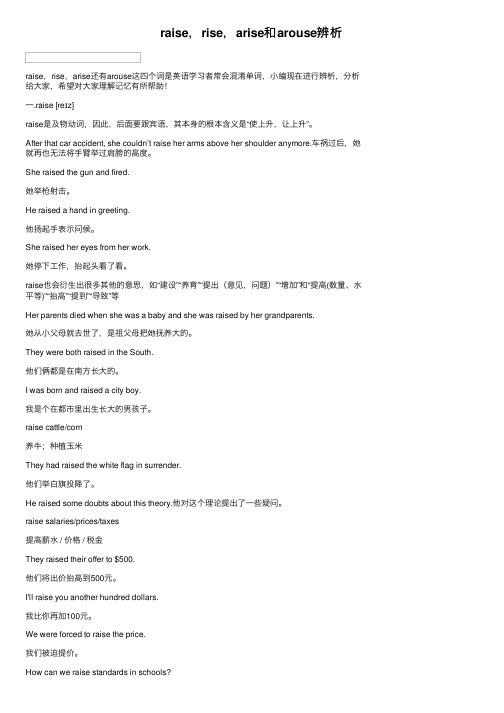
我们怎样才能提⾼学校的⽔平?He set about raising an army .他着⼿组建⼀⽀部队。
The book raises many important questions .这本书提出了许多重要问题。
I'm glad you raised the subject of money.我很⾼兴你提到了钱。
The plans for the new development have raised angry protests from local residents.新的开发计划惹得当地居民愤怒抗议。
It wasn't an easy audience but he raised a laugh with his joke.虽然这些观众很难逗乐,但他的笑话还是引起了⼀阵笑声。
It had been a difficult day but she managed to raise a smile.尽管这⼀天很不顺利,但她还是努⼒露出笑容。
The horses' hooves raised a cloud of dust.马蹄翻飞,扬起⼀⽚尘⼟。
raise a blockade/a ban/an embargo/a siege解除封锁 / 禁令 / 禁运 / 包围(通过⽆线电或电话)与…取得联系,和…通话to contact sb and speak to them by radio or telephoneWe managed to raise him on his mobile phone.我们打他的移动电话,总算找到了他。
raise sth to sb/sth(为…)建造,树⽴(塑像等)The town raised a memorial to those killed in the war.这座⼩镇为战争中牺牲的⼈树⽴了⼀座纪念碑。
raise your glass (to sb)举杯祝酒raise the roof(在屋内)⼤声喧闹,闹翻天raise sb's spirits使振奋;使⿎起勇⽓raise/lower one’s sights提⾼ / 降低要求;眼光变⾼ / 变低⼆.rise [raɪz]上升;攀升;提⾼;达到较⾼⽔平(或位置);起床;起⽴;站起来;升起; 过去式: rose 过去分词: risenrise是不及物动词,因此后⾯并不需要跟事物,很多时候,其意思是“⾃⼰上升,⾃⼰起来”。
人教版初中英语动词raise与rise的用法高频考点、句型讲练
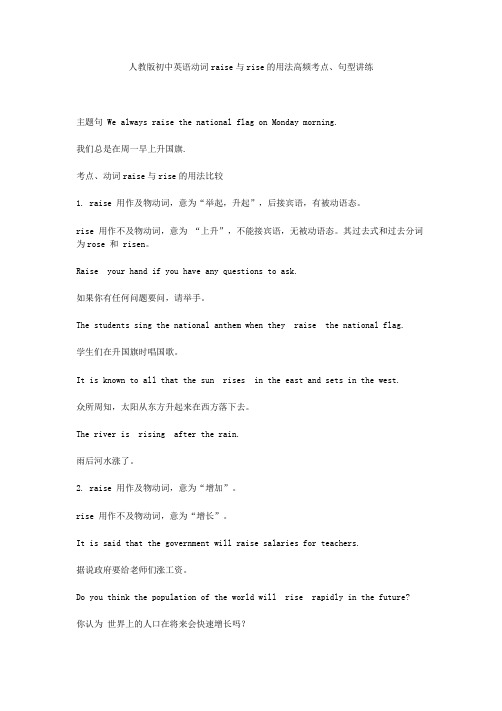
人教版初中英语动词raise与rise的用法高频考点、句型讲练主题句 We always raise the national flag on Monday morning.我们总是在周一早上升国旗.考点、动词raise与rise的用法比较1. raise 用作及物动词,意为“举起,升起”,后接宾语,有被动语态。
rise 用作不及物动词,意为“上升”,不能接宾语,无被动语态。
其过去式和过去分词为rose 和 risen。
Raise your hand if you have any questions to ask.如果你有任何问题要问,请举手。
The students sing the national anthem when they raise the national flag.学生们在升国旗时唱国歌。
It is known to all that the sun rises in the east and sets in the west.众所周知,太阳从东方升起来在西方落下去。
The river is rising after the rain.雨后河水涨了。
2. raise 用作及物动词,意为“增加”。
rise 用作不及物动词,意为“增长”。
It is said that the government will raise salaries for teachers.据说政府要给老师们涨工资。
Do you think the population of the world will rise rapidly in the future?你认为世界上的人口在将来会快速增长吗?。
rise和raise的区别
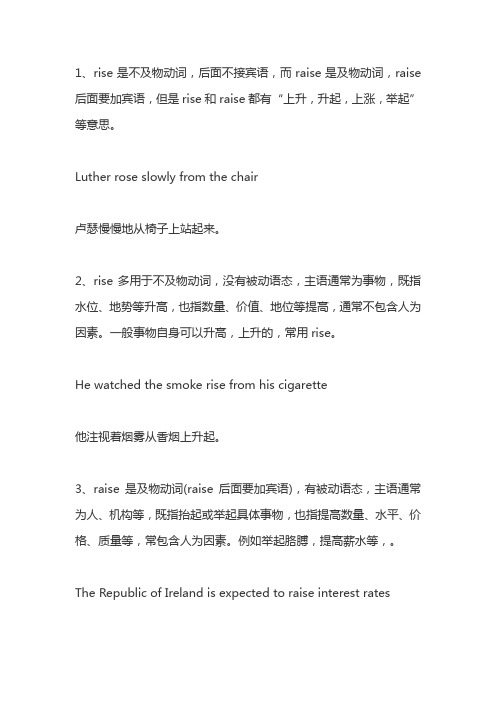
1、rise是不及物动词,后面不接宾语,而raise是及物动词,raise 后面要加宾语,但是rise和raise都有“上升,升起,上涨,举起”等意思。
Luther rose slowly from the chair
卢瑟慢慢地从椅子上站起来。
2、rise多用于不及物动词,没有被动语态,主语通常为事物,既指水位、地势等升高,也指数量、价值、地位等提高,通常不包含人为因素。
一般事物自身可以升高,上升的,常用rise。
He watched the smoke rise from his cigarette
他注视着烟雾从香烟上升起。
3、raise是及物动词(raise后面要加宾语),有被动语态,主语通常为人、机构等,既指抬起或举起具体事物,也指提高数量、水平、价格、质量等,常包含人为因素。
例如举起胳膊,提高薪水等,。
The Republic of Ireland is expected to raise interest rates
爱尔兰共和国预计会提高利率。
4、raise还有养育;种植;饲养的意思。
T
The accident again raises questions about the safety of the plant.
这起事故再一次引发了人们对于工厂安全性的质疑。
raise,rise,arise,arouse辨析
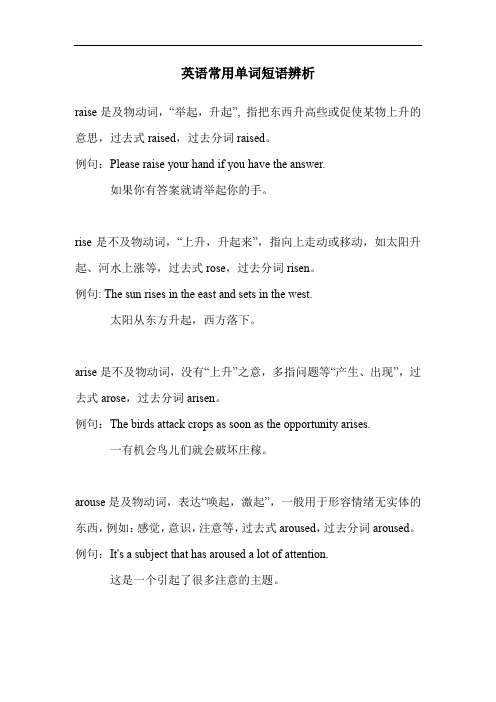
英语常用单词短语辨析
raise是及物动词,“举起,升起”, 指把东西升高些或促使某物上升的意思,过去式raised,过去分词raised。
例句:Please raise your hand if you have the answer.
如果你有答案就请举起你的手。
rise是不及物动词,“上升,升起来”,指向上走动或移动,如太阳升起、河水上涨等,过去式rose,过去分词risen。
例句: The sun rises in the east and sets in the west.
太阳从东方升起,西方落下。
arise是不及物动词,没有“上升”之意,多指问题等“产生、出现”,过去式arose,过去分词arisen。
例句:The birds attack crops as soon as the opportunity arises.
一有机会鸟儿们就会破坏庄稼。
arouse是及物动词,表达“唤起,激起”,一般用于形容情绪无实体的东西,例如:感觉,意识,注意等,过去式aroused,过去分词aroused。
例句:It's a subject that has aroused a lot of attention.
这是一个引起了很多注意的主题。
rise与raise的区别和用法
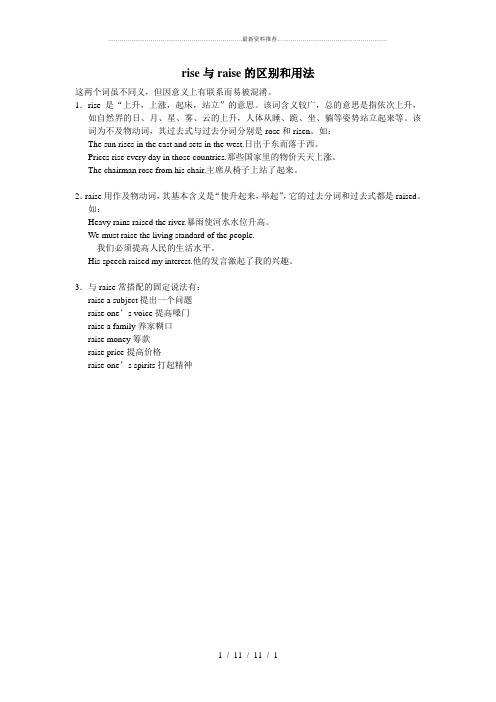
……………………………………………………………最新资料推荐…………………………………………………rise与raise的区别和用法这两个词虽不同义,但因意义上有联系而易被混淆。
1.rise是“上升,上涨,起床,站立”的意思。
该词含义较广,总的意思是指依次上升,如自然界的日、月、星、雾、云的上升,人体从睡、跪、坐、躺等姿势站立起来等。
该词为不及物动词,其过去式与过去分词分别是rose和risen。
如:The sun rises in the east and sets in the west.日出于东而落于西。
Prices rise every day in those countries.那些国家里的物价天天上涨。
The chairman rose from his chair.主席从椅子上站了起来。
2.raise用作及物动词,其基本含义是“使升起来,举起”,它的过去分词和过去式都是raised。
如:Heavy rains raised the river.暴雨使河水水位升高。
We must raise the living standard of the people.我们必须提高人民的生活水平。
His speech raised my interest.他的发言激起了我的兴趣。
3.与raise常搭配的固定说法有:raise a subject提出一个问题raise one’s voice提高嗓门raise a family养家糊口raise money筹款raise price提高价格raise one’s spirits打起精神1 / 11 / 11 / 1。
rise与raise的区别
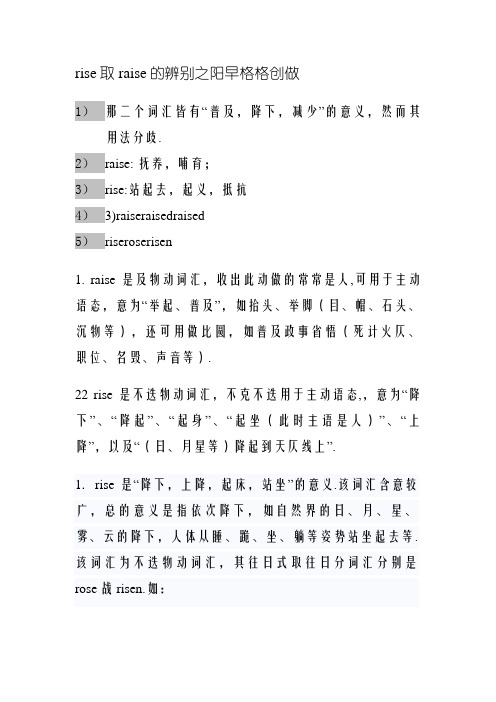
rise取raise的辨别之阳早格格创做1)那二个词汇皆有“普及,降下,减少”的意义,然而其用法分歧.2)raise: 抚养,哺育;3)rise:站起去,起义,抵抗4)3)raiseraisedraised5)riseroserisen1. raise 是及物动词汇,收出此动做的常常是人,可用于主动语态,意为“举起、普及”,如抬头、举脚(目、帽、石头、沉物等),还可用做比圆,如普及政事省悟(死计火仄、职位、名毁、声音等).22 rise 是不迭物动词汇,不克不迭用于主动语态,,意为“降下”、“降起”、“起身”、“起坐(此时主语是人)”、“上降”,以及“(日、月星等)降起到天仄线上”.1.rise是“降下,上降,起床,站坐”的意义.该词汇含意较广,总的意义是指依次降下,如自然界的日、月、星、雾、云的降下,人体从睡、跪、坐、躺等姿势站坐起去等.该词汇为不迭物动词汇,其往日式取往日分词汇分别是rose战risen.如:The sun rises in the east and sets in the west.日出于东而降于西.Prices rise every day in those countries.那些国家里的物价天天上降.The chairman rose from his chair.主席从椅子上站了起去. 2.raise用做及物动词汇,其基原含意是“使降起去,举起”,它的往日分词汇战往日式皆是raised.如:Heavy rains raised the river.暴雨使河火火位降下.We must raise the living standard of the people.咱们必须普及群众的死计火仄.His speech raised my interest.他的收止激起了尔的兴趣. 3.取raise常拆配的牢固道法有:raise a subject提出一个问题raise one’s voice普及嗓门raise a family养家糊心raise money筹款raise price普及代价raise one’s spirits挨起粗神rise战raise皆有"降下,降起,上降,举起"等意义然而是rise多用于不迭物动词汇(rise后里不加宾语),raise是及物动词汇(raise后里要加宾语).另有个简朴的要领,普遍实物自己不妨降下,降下的,时常使用rise,比圆太阳东降,河火上降.而raise普遍是人为天让实物降下,比圆举起胳膊,普及薪火等.The sun rose at seven o'clock.太阳七面钟降起.The river is rising after the rain.雨后河火涨了.The plane was then able to rise and it cleared the mountains by 400 feet."那时飞机能降下了,并正在距山头400英尺的下度飞越了山头."The steps of the palace rise in easy flights.宫殿台阶降下的坡度不大.Prices have risen steadily during the past decade.往日十年间物价向去正在上降.(物价上降是不克不迭人为统造的哦~)He raised his arms above his head.他把脚臂举过头顶.I will not raise a hand against you.尔不会干所有不利于您的事.to raise salaries普及人为to raise the rent普及租金Please raise your hand if you know the answer.(请举脚,主语是您)The sun rises in the east.(太阳降起,主语是太阳)2.raise 战rise 用于共一实物时含意分歧.比圆:迩去电视机提价了.The price of TV sets has been raised recently.(政府战厂家主动止径,普及价钱)The price of TVsets has risen recently.(商场自动安排引导提价,取出卖商无闭)训练:1. He__________his voice so that everybody could hear him.他普及嗓门让大家皆能听睹.2.Steam ________ from very hot water.蒸气从热的火里冒出去.3. She ______from her seat to welcome him(她站起去欢迎他)4. I have to ______ early tomorrow morning(尔来日诰日必须早起).问案:1.raised, 及物动词汇,交了宾语voice2.rises 其后不所有宾语,是不迭物动词汇3.rose 不宾语,需要不迭物动词汇4.rise 不迭物动词汇。
英语单词学习---巧记raise与rise的用法(附练习题及答案)
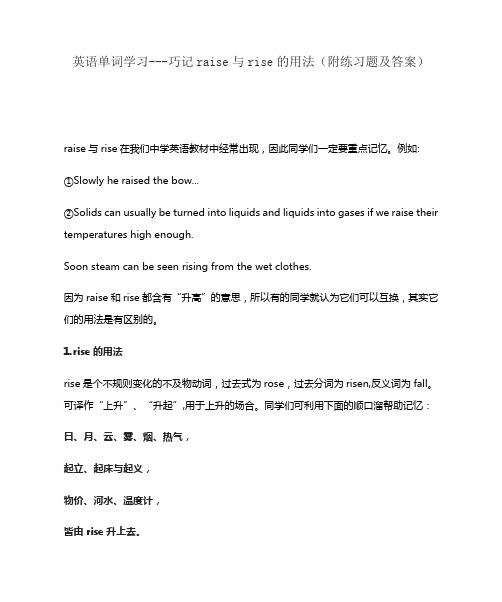
英语单词学习---巧记raise与rise的用法(附练习题及答案)
raise与rise在我们中学英语教材中经常出现,因此同学们一定要重点记忆。
例如:
①Slowly he raised the bow...
②Solids can usually be turned into liquids and liquids into gases if we raise their temperatures high enough.
Soon steam can be seen rising from the wet clothes.
因为raise和rise都含有“升高”的意思,所以有的同学就认为它们可以互换,其实它们的用法是有区别的。
1.rise的用法
rise是个不规则变化的不及物动词,过去式为rose,过去分词为risen,反义词为fall。
可译作“上升”、“升起”,用于上升的场合。
同学们可利用下面的顺口溜帮助记忆:
日、月、云、雾、烟、热气,
起立、起床与起义,
物价、河水、温度计,
皆由rise升上去。
群“起”而攻之——rise与raise用法辨析
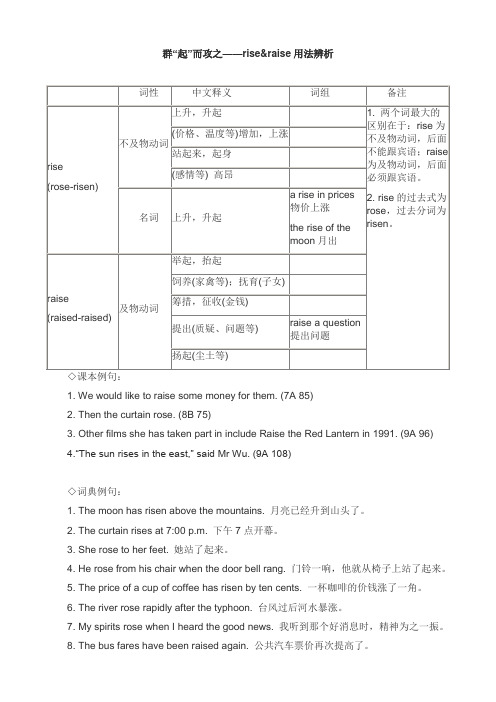
群“起”而攻之——rise&raise用法辨析1. We would like to raise some money for them. (7A 85)2. Then the curtain rose. (8B 75)3. Other films she has taken part in include Raise the Red Lantern in 1991. (9A 96)4.“The sun rises in the east,” said Mr Wu. (9A 108)◇词典例句:1. The moon has risen above the mountains. 月亮已经升到山头了。
2. The curtain rises at 7:00 p.m. 下午7点开幕。
3. She rose to her feet. 她站了起来。
4. He rose from his chair when the door bell rang. 门铃一响,他就从椅子上站了起来。
5. The price of a cup of coffee has risen by ten cents. 一杯咖啡的价钱涨了一角。
6. The river rose rapidly after the typhoon. 台风过后河水暴涨。
7. My spirits rose when I heard the good news. 我听到那个好消息时,精神为之一振。
8. The bus fares have been raised again. 公共汽车票价再次提高了。
9. He raised his voice. 他提高音量。
10. Does anyone have any points to raise? 有人想要提出什么问题吗?11. The wind raised the fallen leaves from the garden. 那阵风把庭院中的落叶刮了起来。
- 1、下载文档前请自行甄别文档内容的完整性,平台不提供额外的编辑、内容补充、找答案等附加服务。
- 2、"仅部分预览"的文档,不可在线预览部分如存在完整性等问题,可反馈申请退款(可完整预览的文档不适用该条件!)。
- 3、如文档侵犯您的权益,请联系客服反馈,我们会尽快为您处理(人工客服工作时间:9:00-18:30)。
例如:The sun rises in the east. 太阳从东方升起。 When does he rise every day? 他每天几点床? Prices are rising. 物价在上涨。 Accustomed to rising early 习惯于早起。 He rose to welcome me.他起身欢迎我。
1、raise的意思是“提高”、“举起”,是及物动词, 既能接宾语,也能用于被动语态。它的宾语一般是头、 手、眼、帽、重物以及政治觉悟、生活水平、物价、温 度、声音等 。 raise one’s hand 举手 raise a flag 升旗 raise a stone 搬石头 raise one’s voice 提高嗓门说话 raise the rate of production 提高生产效率 raise standards of service 提高服务水平
rose (起身) He played so well that everyone_____ to applaud him
